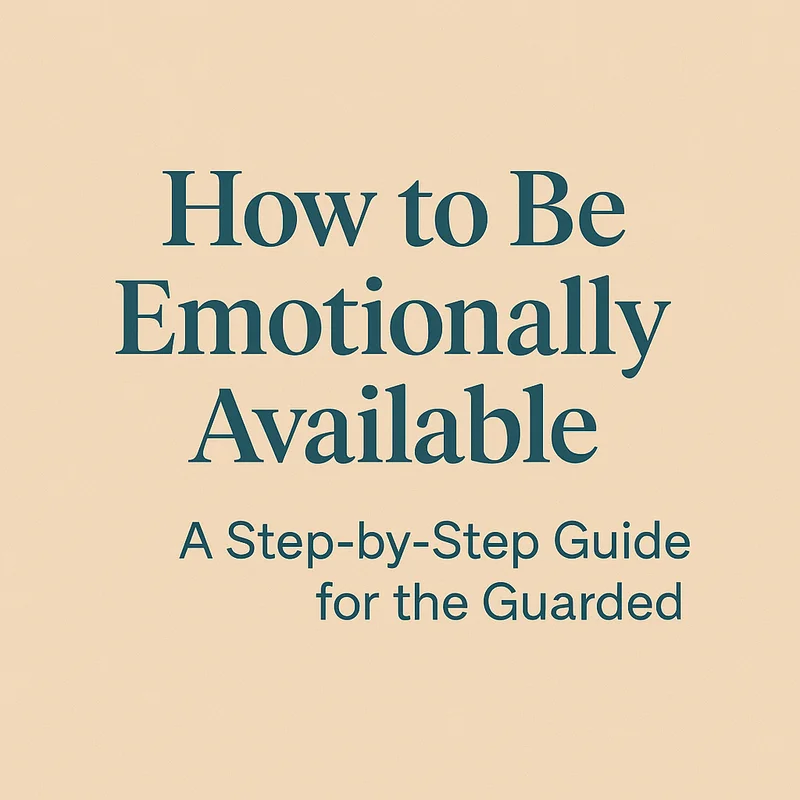
Are you in a relationship that looks perfect on the outside—but inside, you feel distant, detached, or emotionally stuck? Maybe you’ve been told you’re “hard to read,” or you find it difficult to let your guard down, even with people you love.
If that sounds familiar, you’re not alone—and you’re not broken. Emotional availability isn’t something you’re born with or without. It’s a skill—and like any skill, it can be developed. This guide will help you understand what emotional availability really means, why it matters, and how to take practical steps to become more open, present, and connected in your relationships.
What Does It Mean to Be Emotionally Available?
Emotional availability is the ability to share your thoughts and feelings honestly, stay present during emotionally charged conversations, and connect with others in a deep, meaningful way. It means being willing to show up emotionally—even when it’s uncomfortable or vulnerable.
Emotionally available people tend to:
- Express emotions clearly and calmly
- Show empathy toward others
- Listen actively without shutting down
- Stay emotionally engaged during conflict
In contrast, emotionally unavailable individuals often:
- Avoid deep conversations
- Fear being “too vulnerable”
- Pull away when emotions get intense
- Struggle with trust or commitment
Signs You Might Be Emotionally Guarded
Being emotionally guarded isn’t a flaw—it’s often a response to past pain or disappointment. But awareness is the first step toward change.
You might be emotionally guarded if you:
- Struggle to express how you feel
- Distrust people who get “too close” too quickly
- Prefer logic and control over emotional expression
- Feel uncomfortable when others share deep emotions
- Have a history of pushing people away when they want more intimacy
Mini Self-Check:
Answer yes or no:
- Do you often feel safer alone than in a close relationship?
- Do you fear being seen as “weak” if you open up?
- Have you ended relationships to avoid getting hurt?
- Do you keep conversations surface-level, even with loved ones?
If you answered “yes” to two or more, you may be emotionally guarded—but that can change.
Why Emotional Availability Matters in Healthy Relationships
Being emotionally open strengthens your relationships by creating trust, intimacy, and understanding.
Benefits of emotional availability:
- Deeper emotional connection: You and your partner feel seen and valued.
- More effective communication: You can express needs without blaming or shutting down.
- Greater resilience: Emotionally available couples work through conflict instead of avoiding it.
A study published in the Journal of Marriage and Family found that emotional responsiveness between partners significantly predicted long-term relationship satisfaction.
Barriers to Becoming Emotionally Available
Before you can grow, it helps to understand what’s holding you back.
Common emotional blocks:
- Past trauma or heartbreak: If you’ve been hurt before, your brain may default to self-protection.
- Fear of rejection: Opening up might feel like handing someone a weapon they could use against you.
- Cultural or gender expectations: Many people are raised to believe emotional expression is weak or unmasculine.
- Perfectionism or control issues: Vulnerability means letting go of control—and that can feel terrifying.
What helps: Journaling, working with a therapist, or exploring your attachment style can reveal where your emotional walls come from—and how to start dismantling them.
How to Become More Emotionally Available (Step-by-Step)
Becoming emotionally open doesn’t happen overnight—but small, intentional steps can make a big difference.
1. Build Self-Awareness
- Name your emotions as they arise: “I’m feeling anxious… Why?”
- Try journaling for 5 minutes a day to explore your emotional patterns.
- Use apps like Moodnotes or Daylio to track your feelings.
2. Challenge Your Beliefs About Vulnerability
- Ask yourself: “Where did I learn that opening up = danger or weakness?”
- Reframe vulnerability as strength. As Brené Brown says, “Vulnerability is the birthplace of connection and courage.”
3. Start Small With Trusted People
- Don’t dive into your deepest trauma right away. Start by sharing small truths: “I had a tough day” or “That comment hurt my feelings.”
- Gauge the reaction. Often, you’ll find people respond with care, not judgment.
4. Practice Active Listening and Empathy
- Emotional availability goes both ways.
- Show that you’re open to others by listening without interrupting or fixing. Say, “That sounds really hard—thank you for sharing.”
5. Set Healthy Boundaries
- You don’t have to be emotionally “on” all the time.
- Communicate clearly: “I want to talk, but I need a little time to process first.”
- Balance openness with self-protection.
Healing Through Relationships: How Others Can Help
The right people can help you heal emotional wounds you didn’t even know were there.
What safe relationships look like:
- They respect your pace and boundaries
- They validate your feelings instead of minimizing them
- They encourage honest, non-judgmental conversations
What helps:
- Surround yourself with emotionally intelligent people
- Consider couples therapy or individual counseling
- Join support groups for relational trauma or emotional growth
Red Flags to Watch for in Emotionally Unsafe Situations
Not everyone deserves access to your emotional world.
Warning signs:
- They dismiss your emotions or call you “too sensitive”
- They gaslight you or twist your words
- They withdraw emotionally when you express vulnerability
- They guilt-trip you into sharing before you’re ready
Pro tip: Emotional availability is powerful, but it should always be paired with discernment and self-protection.
Staying Consistent: Maintaining Emotional Availability Over Time
Once you’ve opened the door, how do you keep it open?
Tips to stay emotionally present:
- Keep a weekly emotional journal
- Schedule regular check-ins with loved ones
- Revisit therapy or self-help resources during stressful times
- Remember: Setbacks don’t mean failure—they mean you’re human
Conclusion: Choosing Openness One Moment at a Time
Being emotionally available doesn’t mean spilling your guts 24/7. It means showing up as your full, authentic self—even when it’s uncomfortable. If you’ve been guarded for most of your life, it’s okay. Change doesn’t happen in a day. But it does happen in a choice.
Today’s choice could be this:
Tell someone you trust how you really feel. Just a sentence. Just one truth.
Then, breathe. You’re on your way.
FAQs
Q1: Can emotionally unavailable people change?
Yes, with awareness, intentional effort, and often professional support, emotionally unavailable individuals can become more open and connected over time.
Q2: How do I deal with a partner who’s emotionally unavailable?
Model emotional openness, communicate your needs calmly, and encourage therapy. But remember: it’s not your job to fix anyone.
Q3: Is being guarded always a bad thing?
No. Guardedness can be a survival response. The goal is not to get rid of it entirely, but to choose openness where it serves growth.



